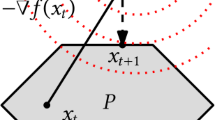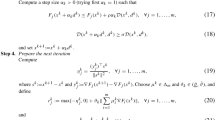Abstract
We consider min–max optimization problems for polynomial functions, where a multivariate polynomial is maximized with respect to a subset of variables, and the resulting maximal value is minimized with respect to the remaining variables. When the variables belong to simple sets (e.g., a hypercube, the Euclidean hypersphere, or a ball), we derive a sum-of-squares formulation based on a primal-dual approach. In the simplest setting, we provide a convergence proof when the degree of the relaxation tends to infinity and observe empirically that it can be finitely convergent in several situations. Moreover, our formulation leads to an interesting link with feasibility certificates for polynomial inequalities based on Putinar’s Positivstellensatz.




Similar content being viewed by others
Notes
This assumption is mostly made to make the developments as simple as possible, but most of our developments would go through for any basic semi-algebraic sets \(\mathcal {X}\) and \(\mathcal {Y}\) through the use of adapted positivity certificates.
This feature is complex-valued but equivalent real-valued formulations with cosines and sines could be used. Since we only use kernel formulations, we do not need to pursue them explicitly.
For a monomial \(X_1^{\alpha _1} \cdots X_d^{\alpha _d}\), its degree is \(\alpha _1+\cdots +\alpha _d\) and its maximal degree is \(\max \{\alpha _1,\dots ,\alpha _d\}.\)
In this paper, we use the term “relaxation” for all our formulations, but, rigorously, they are “strengthenings” when replacing non-negative functions by sums-of-squares, and proper relaxations in their dual formulations, when relaxing moments to pseudo-moments later in this section.
References
Lasserre, J.-B.: Min–max and robust polynomial optimization. J. Glob. Optim. 51(1), 1–10 (2011)
Ben-Tal, A., El Ghaoui, L., Nemirovski, A.: Robust Optimization, vol. 28. Princeton University Press, Princeton (2009)
Nie, J., Yang, Z., Zhou, G.: The saddle point problem of polynomials. Found. Comput. Math. 1–37 (2021)
Lasserre, J.-B.: Global optimization with polynomials and the problem of moments. SIAM J. Optim. 11(3), 796–817 (2001)
Parrilo, P.A.: Semidefinite programming relaxations for semialgebraic problems. Math. Program. 96(2), 293–320 (2003)
Sion, M.: On general minimax theorems. Pac. J. Math. 8(1), 171–176 (1958)
Jahn, J.: Introduction to the Theory of Nonlinear Optimization. Springer, New York (2020)
Laraki, R., Lasserre, J.-B.: Semidefinite programming for min-max problems and games. Math. Program. 131, 305–332 (2012)
Lasserre, J.-B.: Moments, Positive Polynomials and Their Applications, vol. 1. World Scientific, Singapore (2010)
Henrion, D., Korda, M., Lasserre, J.-B.: The Moment-SOS Hierarchy: Lectures in Probability, Statistics, Computational Geometry, Control and Nonlinear PDEs. World Scientific, Singapore (2020)
Bach, F., Rudi, A.: Exponential convergence of sum-of-squares hierarchies for trigonometric polynomials. Technical report, arXiv (2022)
Efthimiou, C.S., Frye, C.: Spherical Harmonics in \(p\) Dimensions. World Scientific, Singapore (2014)
Schmüdgen, K.: The Moment Problem. Springer, Berlin (2017)
Boyd, S., Vandenberghe, L.: Convex Optimization. Cambridge University Press, Cambridge (2004)
Lofberg, J., Parrilo, P.A.: From coefficients to samples: a new approach to SOS optimization. In: Conference on Decision and Control, vol. 3, pp. 3154–3159 (2004)
Rudi, A., Marteau-Ferey, U., Bach, F.: Finding global minima via kernel approximations. Technical Report 2012.11978, arXiv (2020)
Morokoff, W.J., Caflisch, R.E.: Quasi-random sequences and their discrepancies. SIAM J. Sci. Comput. 15(6), 1251–1279 (1994)
Helmberg, C., Rendl, F., Vanderbei, R.J., Wolkowicz, H.: An interior-point method for semidefinite programming. SIAM J. Optim. 6(2), 342–361 (1996)
Fazel, M., Hindi, H., Boyd, S.P.: A rank minimization heuristic with application to minimum order system approximation. In: Proceedings of the American Control Conference, vol. 6, pp. 4734–4739 (2001)
Henrion, D., Lasserre, J.-B.: Detecting global optimality and extracting solutions in Gloptipoly. Positive Polyn. Control 312, 293–310 (2005)
Fang, K., Fawzi, H.: The sum-of-squares hierarchy on the sphere and applications in quantum information theory. Math. Program. 190(1), 331–360 (2021)
Laurent, M., Slot, L.: An effective version of Schmüdgen’s Positivstellensatz for the hypercube. Optim. Lett. 1–16 (2022)
Scherer, C.W., Hol, C.W.J.: Matrix sum-of-squares relaxations for robust semi-definite programs. Math. Program. 107(1–2), 189–211 (2006)
Muzellec, B., Bach, F., Rudi, A.: Learning PSD-valued functions using kernel sums-of-squares. Technical Report 2111.11306, arXiv (2021)
Golub, G.H., Loan, C.F.V.: Matrix Computations. Johns Hopkins University Press, Baltimore (1996)
Ganzburg, M.I.: Multidimensional Jackson theorems. Sib. Math. J. 22(2), 223–231 (1981)
Yu, Y.-L.: The strong convexity of von Neumann’s entropy. Unpublished note (2013). http://www.cs.cmu.edu/~yaoliang/mynotes/sc.pdf
Lemaréchal, C., Sagastizábal, C.: Practical aspects of the Moreau–Yosida regularization: Theoretical preliminaries. SIAM J. Optim. 7(2), 367–385 (1997)
Cover, T.M., Thomas, J.A.: Elements of Information Theory. Wiley, New Jersey (1999)
De Klerk, E., Laurent, M.: On the Lasserre hierarchy of semidefinite programming relaxations of convex polynomial optimization problems. SIAM J. Optim. 21(3), 824–832 (2011)
Putinar, M.: Positive polynomials on compact semi-algebraic sets. Indiana Univ. Math. J. 42(3), 969–984 (1993)
Acknowledgements
The comments and suggestions of the anonymous reviewers were greatly appreciated.
Author information
Authors and Affiliations
Corresponding author
Additional information
Publisher's Note
Springer Nature remains neutral with regard to jurisdictional claims in published maps and institutional affiliations.
Appendices
Appendix A Convergence rates of matrix-valued SOS
We extend the proof of [11, Theorem 1] to matrix-valued polynomials, using the same technique as [21], and following the notations of [11] closely.
Proposition 3
Let \(r>0\) and \(s \geqslant 3r\), and \(\varepsilon (s) = \big [ \big ( 1 - \frac{6r^2}{s^2} \big )^{-d} - 1 \big ] \sim _{s \rightarrow +\infty } \frac{ 6 r^2 d }{s^2}\). For any multivariate matrix-valued trigonometric polynomial f of degree less than 2r, written \(f(x) = \sum _{\Vert \omega \Vert _\infty \leqslant 2r} \hat{f}(\omega ) e^{2i\pi \omega ^\top x}\),
Proof
We consider the following integral operator on 1-periodic matrix-valued functions on \( [0,1]^d\), defined as
for a well-chosen 1-periodic function q which is a trigonometric polynomial of degree s. The function \(x \mapsto |q(x-y)|^2\) is an element of the finite-dimensional cone of SOS polynomials of degree s, thus, by design, if h has positive semi-definite values, then Th is a sum of squares of matrix polynomials of degree less than s. We will find h such that \( Th = f \).
In the Fourier domain, since convolutions lead to pointwise multiplication and vice-versa, we have for all \(\omega \in \mathbb {Z}^d\), where \(\hat{q} *\hat{q}(\omega )\) is a shorthand for \((\hat{q} *\hat{q})(\omega )\):
and thus, the candidate h is defined by its Fourier series, which is equal to zero for \( \Vert \omega \Vert _\infty > 2r\), and to
otherwise. If we impose that \( \hat{q} *\hat{q}(0)=1\), we then have
We then get:
With the choice \( \hat{q}(\omega ) = a \prod \nolimits _{i=1}^d \Big ( 1 - \frac{|\omega _i|}{s} \Big )_+, \) with a a normalizing constant, we get \( \hat{q}*\hat{q}(0)=1\) and \( \max _{ \Vert \omega \Vert _\infty \leqslant 2r} \big | \frac{1}{\hat{q} *\hat{q}(\omega )} \, - 1\big | \leqslant \varepsilon (s)\) (see [11] for details). Thus, for all \(x \in [0,1]^d\), using Eq. (A2) and the assumption on f:
which leads to the desired result. \(\square \)
Appendix B Alternating optimization for the two-stage approach
In this section, we explore briefly the possibility evoked in Sect. 4.1 of trying to minimize Eq. () with respect to \(\Sigma \) as well. This is a non-convex problem, and alternating optimization has a particularly simple formulation. Indeed, in the kernelized version in Eq. (18), this corresponds to replacing \(\mu \) by the previous value of \(\alpha \) and iterating. Since the first upper-bound is minimized exactly, at the second iteration and all later ones, the matrix \(\Sigma \) corresponds to a Dirac measure, and the upper-bounding polynomial is so that its value at this point is minimized. This is shown empirically in Fig. 5: even in the good attraction basin, the alternating optimization does not lead to the global optimum.
Rights and permissions
Springer Nature or its licensor (e.g. a society or other partner) holds exclusive rights to this article under a publishing agreement with the author(s) or other rightsholder(s); author self-archiving of the accepted manuscript version of this article is solely governed by the terms of such publishing agreement and applicable law.
About this article
Cite this article
Bach, F. Sum-of-squares relaxations for polynomial min–max problems over simple sets. Math. Program. (2024). https://doi.org/10.1007/s10107-024-02072-5
Received:
Accepted:
Published:
DOI: https://doi.org/10.1007/s10107-024-02072-5





